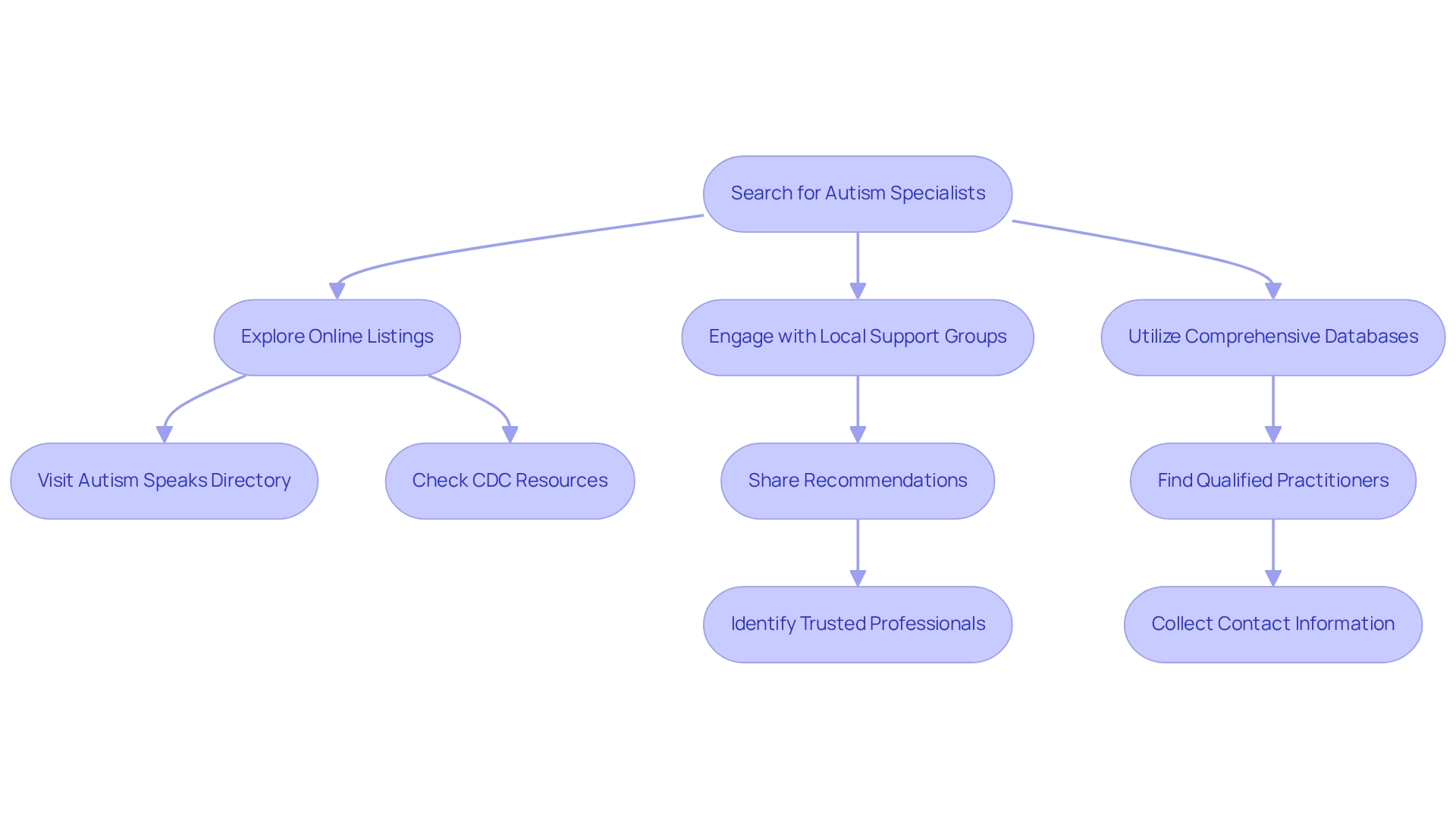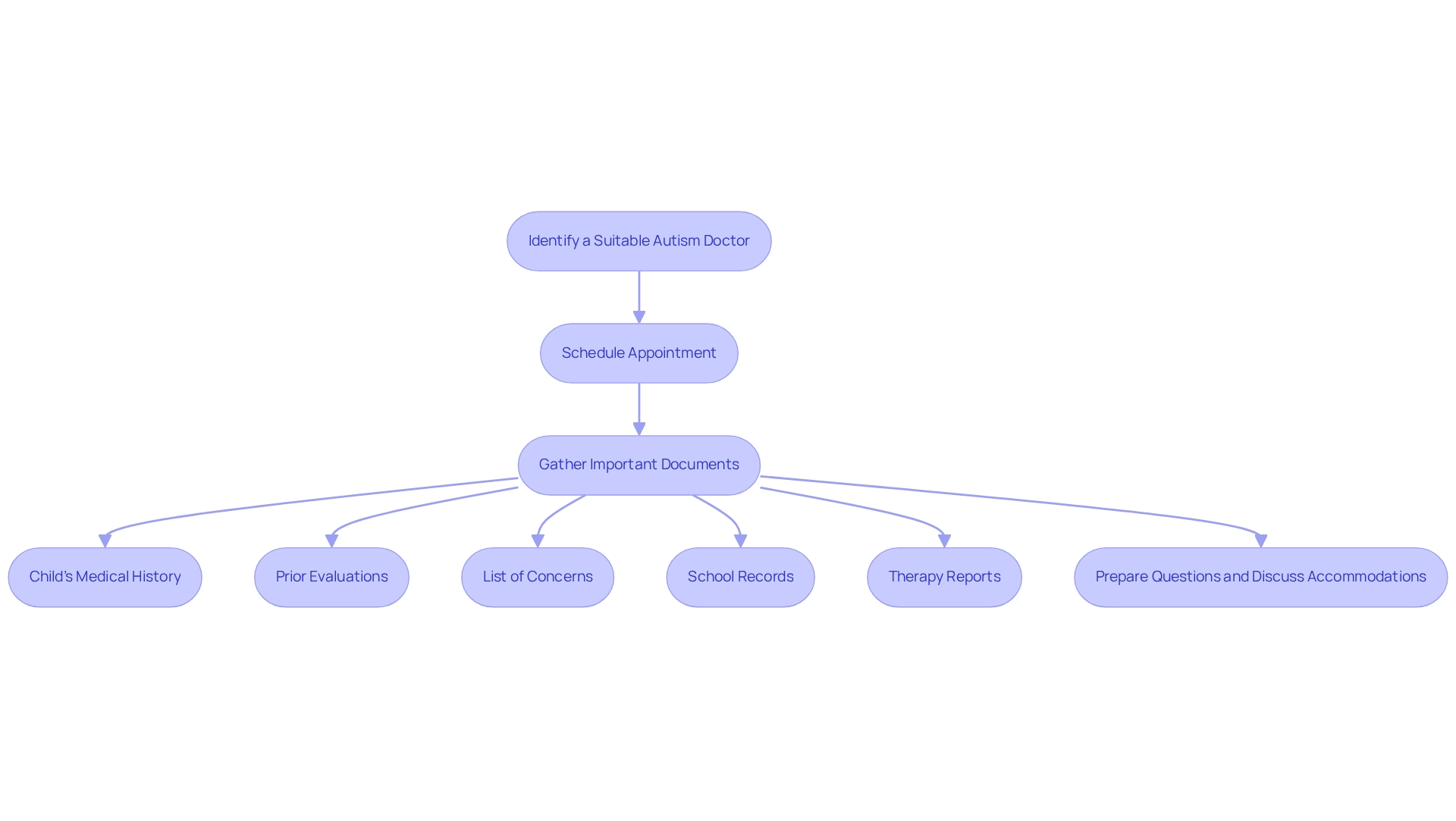Overview
Finding the right autism doctor nearby can feel overwhelming, but it’s a crucial step in supporting your child’s unique needs. This article presents a four-step process that emphasizes:
- Understanding Autism Spectrum Disorder (ASD)
- Researching local specialists
- Evaluating their qualifications
- Preparing for consultations
By following this structured approach, you can navigate the journey with confidence.
Start by familiarizing yourself with ASD; understanding the nuances can empower you as an advocate for your child. Next, take the time to research local specialists who are experienced in this field. Look for professionals who not only have the right qualifications but also resonate with your family’s values.
As you evaluate potential doctors, consider their treatment methodologies and approach. It’s essential to ensure that they align with your child’s specific needs. Preparing for consultations is equally important; being well-prepared allows you to ask the right questions and express your concerns effectively.
Remember, you are not alone in this journey. Many parents have walked this path, and sharing experiences can be incredibly valuable. By utilizing reputable resources and advocating for your child’s needs, you enhance the likelihood of finding the right support. Take that first step today—your child deserves the best care possible.
Introduction
Navigating the world of Autism Spectrum Disorder (ASD) can feel overwhelming for parents, filled with challenges and crucial decisions. With approximately 1 in 29 children diagnosed with ASD, understanding this condition is more important than ever. This article serves as a compassionate guide to help parents:
- Recognize the signs of autism
- Find qualified specialists
- Evaluate treatment options
By equipping themselves with essential knowledge and resources, families can effectively advocate for their child's needs, ensuring that they receive the personalized support necessary for their development. From grasping the nuances of ASD to appreciating the significance of timely intervention, this guide aims to illuminate the path toward a brighter future for children on the spectrum.
Understand Autism Spectrum Disorder
Autism Spectrum Disorder (ASD) is a complex developmental condition that can profoundly affect communication, behavior, and social interaction. For many parents, recognizing the signs of ASD is vital. Symptoms can present in various ways, often including challenges in social communication, restricted interests, and repetitive behaviors. By understanding these indicators, you can better articulate your child's needs when seeking medical support. Familiarizing yourself with the diagnostic criteria and common symptoms is essential; resources from reputable organizations such as the CDC and Autism Speaks offer valuable insights.
Consider this: recent statistics show that about 1 in 29 children in New Jersey are diagnosed with ASD, which equates to roughly 3.5% of the youth population. This highlights the importance of awareness and understanding as you navigate this journey. Moreover, educational outcomes reveal that 74% of autistic students in the U.S. graduate with a diploma. This underscores the critical role of early diagnosis and support in fostering success.
It's also noteworthy that higher prevalence rates of ASD have been observed in lower-income neighborhoods, pointing to socio-economic factors that may influence diagnosis and awareness. By equipping yourself with this foundational knowledge, you will be better prepared to find the right autism doctor near me for your child. Remember, you are not alone in this journey; there are resources and communities ready to support you every step of the way.
Research Local Autism Specialists
Begin your search for an autism doctor near me by exploring online listings, such as the Autism Speaks directory and the CDC's resources. These platforms are frequently updated, ensuring you have access to the most current information, including updates for 2025. Additionally, local health department websites can provide valuable directories of qualified professionals, such as an autism doctor near me, in your area.
Engaging with local autism support groups or organizations is essential, as they often share recommendations based on firsthand community feedback. This can help you identify trusted professionals who understand the unique challenges faced by families. For instance, many parents have found success through community input on local experts, such as an autism doctor near me, underscoring the significance of these relationships.
Moreover, platforms like Psychology Today and MediFind offer comprehensive databases to help you find qualified practitioners tailored to your needs. Remember, ABA therapy can lead to measurable improvements in everyday life for individuals with autism, making it crucial to locate the right professional for your child.
As you compile a list of potential experts, be sure to include their contact information and specific areas of expertise. This will facilitate your outreach and decision-making process. As Haley Moss insightfully noted, 'I might hit developmental and societal milestones in a different order than my peers, but I am able to accomplish these small victories on my own time.' This perspective beautifully highlights the importance of personalized support in your child's journey.

Evaluate Qualifications and Treatment Approaches
When considering an autism doctor near me for autism treatment, it’s crucial to examine their educational qualifications and relevant certifications, such as Board Certified Behavior Analyst (BCBA) or Licensed Psychologist specializing in Autism Spectrum Disorder (ASD). Research shows that about 80% of autism professionals implement evidence-based practices, particularly Applied Behavior Analysis (ABA), which effectively supports the development of positive behavioral skills.
Engaging in conversations with various experts can deepen your understanding of their treatment philosophies and methodologies. Prepare a thoughtful list of questions for these discussions, such as their experience with children who have similar needs and their approach to tracking progress in treatment. Additionally, consider case studies that showcase the success of tailored interventions, especially for autistic individuals facing co-occurring conditions. These insights can provide a clearer view of how the expert addresses the unique challenges encountered by autistic individuals.
Moreover, the significance of BCBA certification is paramount; it represents a commitment to maintaining high standards in autism treatment. By prioritizing these factors, you can make a well-informed decision in selecting the right autism doctor near me for your child's care. After evaluating qualifications and treatment strategies, the next step is to assess the professional's availability and how well they align with your family's needs.
Schedule Appointments and Prepare for Consultations
Once you have identified a suitable autism doctor near me, it’s essential to schedule an appointment without delay, as average wait times can be significant. Research shows that 83% to 87% of individuals assessed receive a neurodevelopmental diagnosis, underscoring the importance of timely intervention. Dr. Colin Zimbleman beautifully states, "Autism… offers us a chance for us to glimpse an awe-filled vision of the world that might otherwise pass us by."
To prepare for your consultation, gather important documents, including:
- Your child’s medical history
- Prior evaluations
- A list of specific concerns you wish to discuss
Additionally, collecting any relevant school records or therapy reports can provide deeper insight into your child’s needs. Creating a list of questions can be very helpful; consider asking about the specialist’s treatment approach and how they involve parents in the process. If your child has unique needs, proactively discuss any necessary accommodations to ensure a comfortable and productive visit.
This preparation not only facilitates a smoother consultation but also empowers you to advocate effectively for your child’s care. Remember, understanding and acceptance are crucial for unlocking potential, as highlighted in recent case studies on societal perceptions of autism. Your journey is important, and seeking the right support can make a significant difference.

Conclusion
Understanding Autism Spectrum Disorder marks the beginning of a hopeful journey filled with potential. By recognizing the signs of autism, parents can better advocate for their child’s needs, ensuring they receive timely intervention and support. The statistics surrounding autism highlight the critical need for awareness and education, empowering families to navigate this complex landscape with confidence.
Finding qualified specialists is a vital part of this journey. Utilizing resources such as online directories and local support groups can help connect families with trusted professionals who grasp the unique challenges faced by children on the spectrum. The significance of personalized support cannot be overstated; it is through these tailored interventions that children can reach significant milestones.
Evaluating the qualifications and treatment approaches of potential specialists further empowers parents to make informed decisions. By concentrating on evidence-based practices and engaging in consultations, families can ensure their child receives the most effective care. A commitment to high standards in autism treatment is essential for fostering positive developmental outcomes.
Ultimately, scheduling appointments and preparing for consultations goes beyond merely gathering information; it lays the groundwork for a collaborative partnership between families and specialists. This partnership is crucial for unlocking each child’s potential, paving the way for a brighter future. Embracing this journey with knowledge, support, and a proactive mindset can transform challenges into opportunities for growth and success.
Frequently Asked Questions
What is Autism Spectrum Disorder (ASD)?
Autism Spectrum Disorder (ASD) is a complex developmental condition that significantly affects communication, behavior, and social interaction.
What are the common signs and symptoms of ASD?
Common signs of ASD include challenges in social communication, restricted interests, and repetitive behaviors.
Why is it important for parents to recognize the signs of ASD?
Recognizing the signs of ASD is vital for parents as it helps them articulate their child's needs when seeking medical support.
Where can I find reliable information about ASD?
Reliable information about ASD can be found through reputable organizations such as the CDC and Autism Speaks, which provide valuable insights into the diagnostic criteria and symptoms.
What are the statistics regarding ASD diagnoses in children?
Recent statistics indicate that about 1 in 29 children in New Jersey are diagnosed with ASD, which is approximately 3.5% of the youth population.
What is the graduation rate for autistic students in the U.S.?
Approximately 74% of autistic students in the U.S. graduate with a diploma, highlighting the importance of early diagnosis and support.
Are there socio-economic factors that influence ASD diagnosis?
Yes, higher prevalence rates of ASD have been observed in lower-income neighborhoods, suggesting that socio-economic factors may impact diagnosis and awareness.
How can I find support for my child with ASD?
By equipping yourself with foundational knowledge about ASD, you can better prepare to find the right autism doctor for your child. There are also resources and communities available to support you throughout this journey.




